Backing Brazil beyond Olympics
Updated: 2016-08-01 07:34
By ZHONG NAN/LIU MINGTAI(China Daily)
|
||||||||
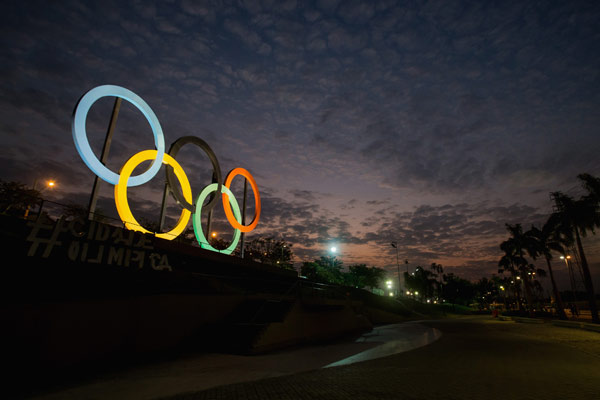 |
|
The Olympic rings at Madureira Park, on July 19, 2016, in Rio de Janeiro, Brazil. The Rio Olympic Games will run from August 5-21. [Photo/VCG] |
As Brazil hopes to ride the recent Olympics-related economic activity towards long-term growth with stress on world class infrastructure, the local market share of Chinese companies is expected to increase.
For instance, CRRC Changchun Railway Vehicles Co has provided subway trains to Rio de Janeiro's rail systems. If the trains win laurels during the Games, the company will likely expect more orders in future.
Similarly, China's construction machinery makers, including Xuzhou Construction Machine Group and Sany Group, have already been buoyed by orders from Brazil.
Brazil had received a $12-billion loan from the World Bank to help finance infrastructure projects in preparation for this month's Olympics.
Part of those preparations involved orders for 15 subway trains with 90 cars, for Line 4 in Rio, the Olympics venue. CRRC Changchun seized that order.
CRRC Changchun, a subsidiary of China Railway Rolling Stock Corp, the country's largest trainmaker, had supplied its rail cars well in advance. They were used to help ferry football fans between Rio's central station and the Maracana Stadium during the 2014 FIFA World Cup football.
Wang Huaifeng, chief representative for CRRC Changchun's rail project in Rio de Jdaneiro, said new Chinese subway trains will also play an essential role in transportation during the Games. They will be used on the city's Line 4, a key infrastructure project that connects the Olympic Village and the Copacabana center in Rio.
A subway train typically comprises six cars that together can carry up to 2,240 people and run at a maximum speed of 100 km per hour.
CRRC Changchun's trains in Brazil are equipped with an overspeed protection device, which will automatically sound alert and help slow down the train once the speed reaches the limit.
"All trial tests, including electric power, ventilation and the signal system, had been concluded in June and the metro line is scheduled to be operated in the city on August 1," said Wang.
The subway trains are made of A-type stainless steel and boast a far more compressive load than that of an ordinary train. This means it can ensure passenger safety in the case of any head-on collision with an 80-ton truck running at a speed of 36 km per hour.
Feng Hao, a rail transportation researcher at the National Development and Reform Commission, said compared with car-dominated urban traffic systems, urban light rail services generate less emissions and offer lower costs. "They are ideal for mass transportation systems, especially in major cities or tourism destinations."
The company now has a technical team of 60 people in Rio to oversee operations ahead of the Games. They will stay there until the end of August. This is the first time that a Chinese trainmaker has provided transportation service outside China for the Olympic Games.
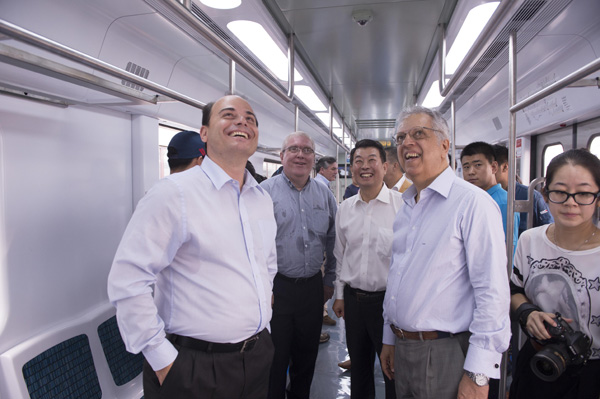 |
|
Brazilian transport officials inspect an electric multiple unit made by CRRC Changchun Railway. CRRC Changchun has provided 100 EMUs to Rio de Janeiro's rail systems. PROVIDED TO CHINA DAILY |
Like CRRC Changchun, Chinese construction machinery makers such as XCMG, fresh from robust growth in the domestic market, are geared up to take advantage of the huge opportunities coming their way in Brazil's vast infrastructure market. Again, they have Rio 2016 to thank for.
XCMG announced earlier this month that it will add $99.7 million to its branch in Brazil to enhance the production capability and improve its asset structure. It will also lower the risk caused by currency fluctuations, besides adding more local dealerships and distribution warehouses. It will also boost its spare parts sales and leasing businesses in Brazil.
Cui Jisheng, general manager of XCMG (Brazil) Co Ltd, said the 2014 FIFA World Cup and the 2016 Olympic Games certainly have offered huge opportunities to Brazil's construction equipment makers.
"Chinese construction machinery makers are set to become some of the largest beneficiaries of this transformation in Brazil," he said.
Indeed, Brazil became the largest importer of Chinese truck cranes in 2013. Chinese crane enterprises claimed a 91 percent market share in Brazil in 2015, according to data from the China Council for the Promotion of International Trade.
"XCMG (Brazil) will set up direct-service platforms for its customers. Such platforms will send customers the latest product information, while specialists in different places will offer advice on saving fuel, maintenance and component replacement over the next three years," Cui said.
Cui further said even though the Olympic Games run from Aug 5 to 21, Brazil's demand for infrastructure will continue to attract Chinese companies over the next decade.
The Brazilian economy went into a recession in 2015, but the country witnessed a surge in mergers and acquisitions by overseas companies of late. Some 285 big-ticket deals were sealed, and foreign direct investment reached $70 billion, partly thanks to the country's fast-growing sport-driven economy.
- From hunting wild fruits to satellite dishes: Life of Myanmar returnees
- World's first panda-themed subway line runs in Chengdu
- Minister: PLA to firmly protect maritime rights
- China raises alert level ahead of Typhoon Nida
- Japanese suspect detained in security inquiry
- Xi: Disaster relief must be improved
- Powerful blast rocks Afghan capital amid darkness
- Tokyo elects 1st female governor
- 450th Old Bridge diving competition held in Mostar
- S. Korea to launch WWII 'comfort women' victims foundation
- China to become Australia's biggest tourist source market
- Patient shoots, kills doctor in Berlin then kills himself
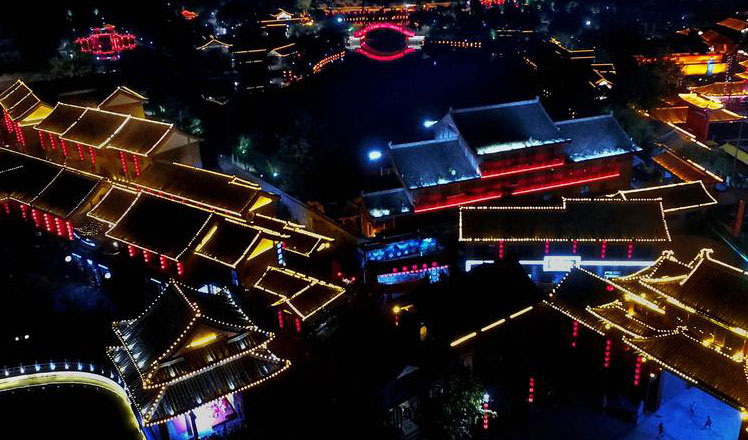
 Amazing night view of Kaifeng in Henan province
Amazing night view of Kaifeng in Henan province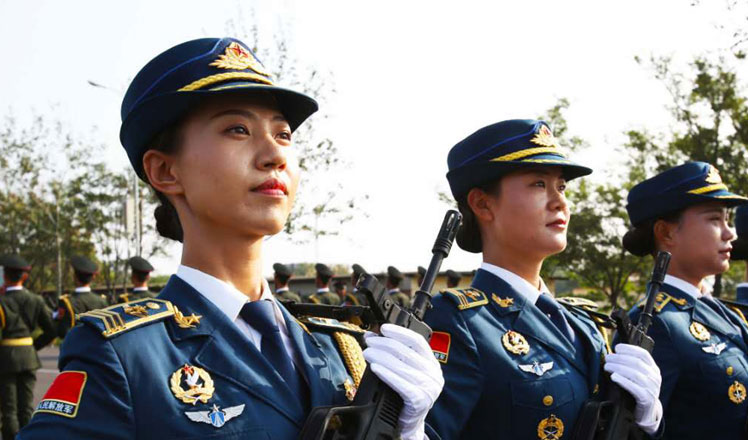
 In pics: Women soldier carrying the flag
In pics: Women soldier carrying the flag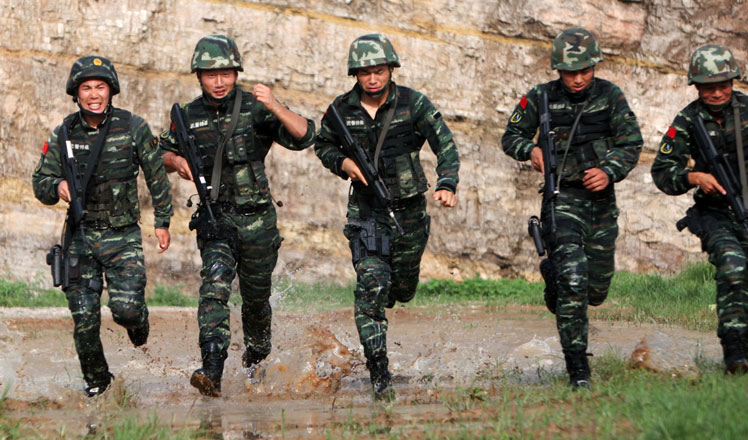
 Rough and tough world of soldiers' training
Rough and tough world of soldiers' training
 Moments from the 2016 Tour of Qinghai Lake
Moments from the 2016 Tour of Qinghai Lake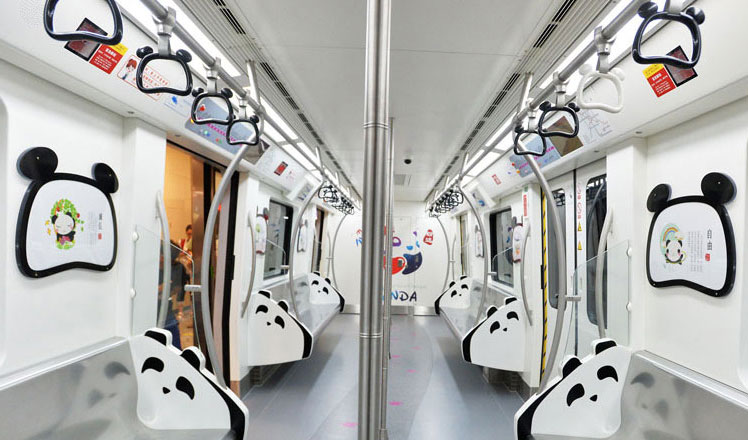
 Panda-themed subway line runs in Chengdu
Panda-themed subway line runs in Chengdu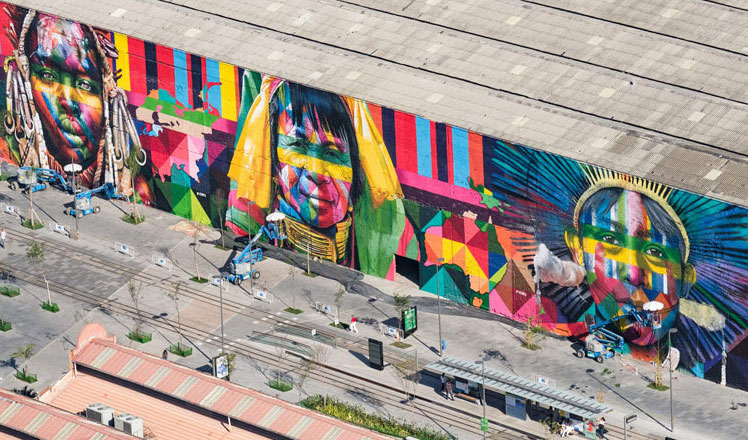
 In pictures: Aerial images of Rio's Olympic venues
In pictures: Aerial images of Rio's Olympic venues
 Images reveal distinctive Tunpu culture in Guizhou
Images reveal distinctive Tunpu culture in Guizhou
 Ten photos from around China: July 22 – 28
Ten photos from around China: July 22 – 28
Most Viewed
Editor's Picks

|

|

|

|

|

|
Today's Top News
Ministry slams US-Korean THAAD deployment
Two police officers shot at protest in Dallas
Abe's blame game reveals his policies failing to get results
Ending wildlife trafficking must be policy priority in Asia
Effects of supply-side reform take time to be seen
Chinese State Councilor Yang Jiechi to meet Kerry
Chinese stocks surge on back of MSCI rumors
Liang avoids jail in shooting death
US Weekly

|

|








